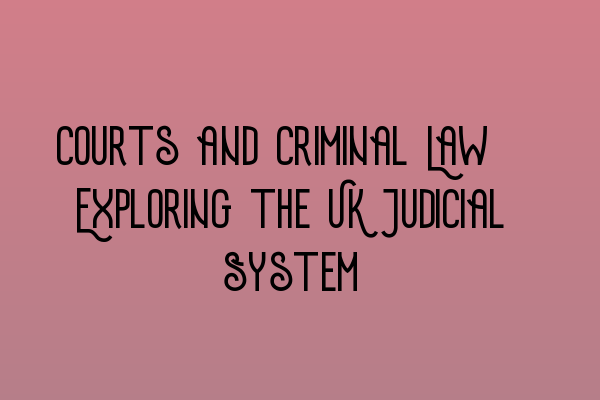Courts and Criminal Law: Exploring the UK Judicial System
Welcome to SQE Criminal Law & Practice Law UK, your comprehensive resource for all matters related to criminal law. In this blog post, we will delve into the UK judicial system and provide you with an in-depth understanding of the courts and their functions.
The UK Judicial System
The UK judicial system is a complex and essential component of the legal framework. It ensures the fair adjudication of criminal cases and upholds the rule of law. Understanding its structure and function is crucial for legal professionals and anyone interested in criminal justice.
The UK judicial system consists of several tiers of courts, each with its own jurisdiction and responsibilities. The hierarchy starts with the lower courts, such as Magistrates’ Courts, which handle less serious offenses, preliminary hearings, and bail applications. For more serious cases, the Crown Court takes over. It has the power to impose longer sentences and handle trials that involve either a jury or a judge.
As criminal matters progress through the system, they may reach the appellate courts. The Court of Appeal handles appeals against convictions or sentences, while the Supreme Court, the highest court in the land, deals with matters of national significance and constitutional interpretation.
The Role of Judges
Judges play a crucial role in the UK judicial system. Their impartiality and expertise ensure the proper administration of justice. They preside over trials, hear evidence, and deliver judgments based on the law and the facts presented during the proceedings.
Judges in the Magistrates’ Courts, known as District Judges, help to maintain order and fairness in lower-level cases. They make decisions on guilt or innocence and determine suitable sentences if required.
In the Crown Court, cases are heard by Circuit Judges or, in more serious matters, by High Court Judges. They have the authority to impose sentences, including imprisonment, and decide whether a trial should proceed with a jury or be determined by the judge alone.
The Role of Juries
Juries have an important function in the UK judicial system, bringing diverse perspectives and ensuring public participation in the administration of justice. In certain criminal cases, a jury is selected from the community to decide on guilt or innocence based on the evidence presented during the trial.
The right to trial by jury is a fundamental principle, reflecting the belief that decisions on a person’s liberty should be made by their peers. Juries provide a democratic element to the system, preventing concentration of power in the hands of judges or magistrates alone.
How to Prepare for a Career in Criminal Law
If you’re considering a career in criminal law, it’s crucial to obtain the necessary qualifications and experience. The SQE (Solicitors Qualifying Examination) is the new route to qualifying as a solicitor in England and Wales. To pass the SQE, it’s important to prepare thoroughly by taking SQE 1 preparation courses and practicing with SQE 1 practice exam questions and SQE 1 practice mocks FLK1 FLK2.
Once you have successfully completed SQE 1, you can progress to SQE 2, which focuses on more practical legal skills. SQE 2 preparation courses are available to help you achieve success on this stage of the examination.
Stay updated on the latest SRA SQE exam dates to plan your study schedule effectively and ensure you are fully prepared for each stage of the examination.
We hope this overview of the UK judicial system has provided you with valuable insights. If you have any further questions or need guidance on your legal journey, don’t hesitate to reach out to SQE Criminal Law & Practice Law UK.
Sources:
SQE 1 Practice Exam Questions,
SQE 1 Practice Mocks FLK1 FLK2,
SQE 2 Preparation Courses,
SQE 1 Preparation Courses,
SRA SQE Exam Dates
